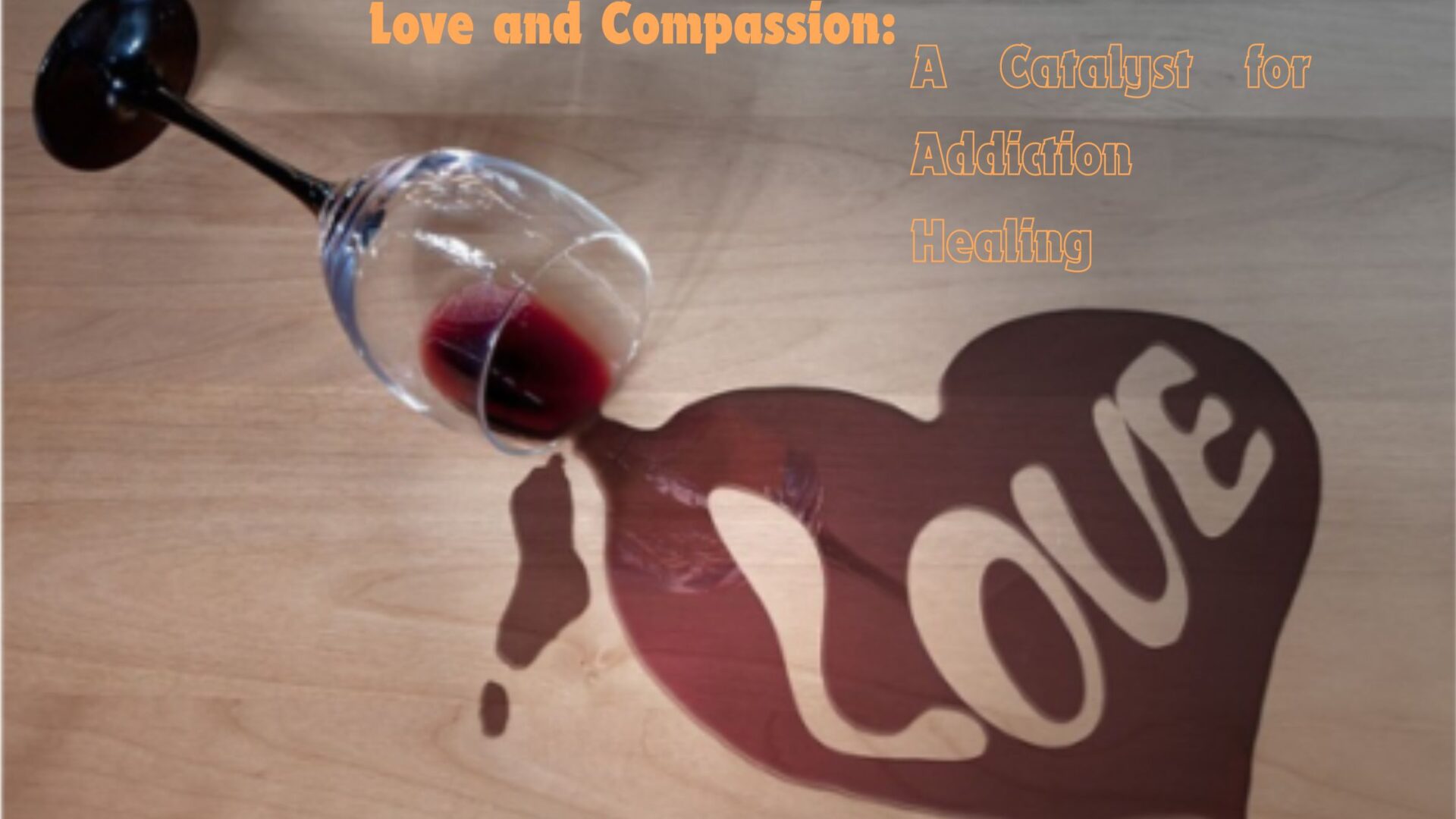Introduction:-
Love and Compassion: A Catalyst for Addiction Healing

Addiction is a complex and often devastating condition that affects not only the individuals trapped in its grip but also their families and communities. While medical treatments, therapy, and support groups play essential roles in addiction recovery, the power of love and compassion should not be underestimated. In this article, we will explore how love and compassion can serve as catalysts for healing in the context of addiction.
How does addiction impact both individuals and their communities, and why is it important to include love and compassion in addiction recovery alongside medical treatments and therapy?
Understanding Addiction
Before delving into the role of love and compassion in addiction healing, it’s crucial to understand addiction itself. Addiction is a chronic, relapsing brain disease characterized by compulsive drug seeking and use, despite harmful consequences. It affects the brain’s reward system, making individuals more inclined to pursue substances or behaviors that provide pleasure, even when they are aware of the negative repercussions.
Addiction often leads to a range of physical, psychological, and social issues, including strained relationships, job loss, and deteriorating health. It is a condition that affects not only the individual struggling with it but also their loved ones who witness the person’s suffering and decline.
The Role of Love
- Unconditional Support: Love from friends and family can provide a crucial foundation for an individual in recovery. Knowing that they are loved unconditionally, even in the face of addiction, can motivate individuals to seek help and work towards sobriety.
- Reinforces Self-Worth: Addiction often erodes an individual’s self-esteem and self-worth. The love and support of loved ones can help rebuild these aspects of a person’s identity, reinforcing their belief in their ability to recover.
- Motivation to Change: Love can be a powerful motivator for change. The desire to protect and maintain positive relationships with loved ones can drive individuals to seek treatment and work towards recovery.
- Reduces Stigma: Love can reduce the stigma associated with addiction. When individuals feel accepted and loved despite their struggles, they are more likely to seek help without fear of judgment.
The Power of Compassion
- Empathy and Understanding: Compassion involves understanding the suffering of another person and wanting to alleviate that suffering. When individuals struggling with addiction encounter compassion, they feel understood and less isolated in their pain.
- Reducing Shame: Shame is a significant barrier to seeking help for addiction. Compassion helps reduce shame by conveying the message that addiction is a medical condition, not a moral failing.
- Building Trust: Compassion builds trust between individuals in recovery and their support networks. Trust is essential for effective communication and collaboration in the journey to recovery.
- Promotes Self-Compassion: When individuals experience compassion from others, they are more likely to develop self-compassion, which is a crucial component of addiction recovery. Self-compassion involves treating oneself with kindness and understanding rather than self-criticism.
Practical Ways to Express Love and Compassion
- Active Listening: Take the time to listen actively when someone shares their struggles with addiction. Offer your full attention and refrain from judgment or interruption.
- Encourage Treatment: Encourage your loved one to seek professional help and support their treatment journey. Offer to help them find suitable treatment options and accompany them to appointments if they wish.
- Educate Yourself: Learn about addiction and its challenges. Understanding the condition better can help you provide more informed and empathetic support.
- Set Boundaries: While love and compassion are essential, it’s also crucial to set and maintain healthy boundaries. Enabling addictive behavior can be counterproductive, so seek guidance on how to strike the right balance.
- Attend Support Groups: Consider joining support groups for families and friends of individuals with addiction. These groups provide a safe space to share experiences and learn from others facing similar challenges.
- Practice Patience: Recovery is a journey with ups and downs. Be patient and understanding, even when setbacks occur.
- Celebrate Progress: Acknowledge and celebrate your loved one’s milestones and progress in recovery, no matter how small they may seem.
The Healing Journey
Addiction recovery is not a linear process, and it often involves setbacks and relapses. However, with love and compassion as driving forces, individuals can find the strength to continue their journey toward sobriety.
It’s important to remember that love and compassion are not a replacement for professional treatment. Addiction is a medical condition that often requires specialized care. Professional treatment modalities, such as counseling, therapy, medication, and support groups, are essential components of addiction recovery.
Love and compassion complement these treatments by providing a support system that fosters hope, reduces stigma, and empowers individuals to confront their addiction. When individuals feel loved and supported, they are more likely to engage in and benefit from addiction treatment.
How to emotionally, lovingly and compassionately prepare a person to recover from drug addiction?
Supporting a person in recovering from drug addiction with emotional love and compassion is a sensitive and crucial process. Here are steps to help you emotionally, lovingly, and compassionately prepare someone for addiction recovery:

- Educate Yourself: Before you can effectively help someone, it’s essential to understand addiction, its nature, and treatment options. Knowledge will help you approach the situation with empathy and without judgment.
- Open Communication: Create an open and non-judgmental space for conversation. Let the person know that you are there to listen and support them, no matter what they say.
- Express Your Concerns: Share your genuine concerns about their well-being. Use “I” statements to convey your feelings, like “I’m worried about your health and happiness.”
- Avoid Blame and Accusations: Refrain from blaming or accusing the person of their actions. Addiction is a complex issue, and guilt and blame can hinder progress.
- Offer Unconditional Love: Reiterate your love and support for the person. Make it clear that your love is not conditional on their recovery but that you believe in their ability to heal.
- Set Boundaries: While expressing love, establish healthy boundaries. Let them know what behavior you will not tolerate, such as substance use around you or in your home.
- Encourage Professional Help: Suggest seeking professional assistance, such as counseling or therapy, which can provide the necessary tools for recovery.
- Be Patient: Recovery is a process that takes time, and relapses are not uncommon. Patience is essential, and it’s crucial to continue supporting the person through setbacks.
- Support Decision-Making: Encourage them to be actively involved in their recovery plan. Offer support as they make decisions about their treatment and goals.
- Attend Support Meetings Together: Consider attending support groups or therapy sessions with them if they are comfortable. This can demonstrate your commitment to their recovery.
- Avoid Enabling: Be mindful not to enable their addictive behavior. Enabling can include providing money, covering up their actions, or making excuses for them.
- Celebrate Milestones: Celebrate their successes, no matter how small. Acknowledge their efforts and progress in their journey to recovery.
- Promote a Healthy Lifestyle: Encourage them to adopt a healthier lifestyle by focusing on nutrition, exercise, and stress management. These factors can support recovery.
- Practice Self-Care: Supporting someone with addiction can be emotionally draining. Ensure you take care of your own emotional and physical well-being too.
- Seek Professional Guidance for Yourself: Consider attending therapy or support groups for families and friends of individuals with addiction. These resources can help you cope with the challenges you may face.
- Avoid Stigmatizing Language: Be mindful of the words you use. Avoid stigmatizing language or derogatory terms, as they can be hurtful and counterproductive.
- Provide Resources: Offer information about local addiction treatment centers, hotlines, and resources that can provide additional support.
- Stay Connected: Maintain regular contact with the person, even if it’s just to check in. Knowing that someone cares can be a significant motivator.
- Be Ready for Setbacks: Understand that relapses can happen. Instead of reacting with anger or disappointment, approach setbacks with understanding and encourage them to get back on track.
- Never Give Up: Most importantly, never give up on the person. Addiction recovery is a challenging journey, and your continued love and support can make a significant difference in their ability to overcome it.
Remember that addiction recovery is unique to each individual, and what works for one person may not work for another. Your unwavering emotional love and compassion can be a guiding light in their path to recovery.
Conclusion
Love and compassion are powerful catalysts for addiction healing. They provide individuals with the emotional support and motivation they need to seek treatment, face the challenges of recovery, and rebuild their lives. By fostering an environment of love and compassion, we can contribute to breaking the cycle of addiction, reducing stigma, and promoting lasting recovery. Addiction is a formidable adversary, but with love and compassion as allies, individuals can find the strength to overcome it and rediscover a life of purpose and fulfillment.







